The Asia Pacific Privacy Authorities Forum has declared this week–May 16-20, 2016–Privacy Awareness Week, during which privacy agencies from across the Pacific Ocean share information about privacy practices and rules. This year, agencies like the Federal Trade Commission are disseminating practical tips for consumers to help safeguard their most sensitive information.
In the spirit of Privacy Awareness Week, we are taking a closer look at Virtual Private Networks (VPNs) and the role they do and should play in our daily lives. A VPN is a private encrypted network that operates across the public internet. For example, many large companies provide VPNs to provide their employees with secure remote access to confidential business documents.
Businesses are now selling VPN services to households, and some are presenting very curious value propositions. For example, a client recently forwarded me an e-mail advertisement from SaferWeb, which stated: “There has been a lot of coverage in the press lately about the Government monitoring your online activity and keeping logs of your browsing history. In fact, Internet censorship is at an all time high and the only way to avoid it is by using a VPN. By using SaferWeb you block anyone from monitoring what you do online – make sure you never connect to the Internet without it.”
VPNs offer a range of benefits, but for the average law-abiding household, protection from the government should be very low on the list. It is true that the government can access to a lot of information about us and our online activity, but there are very few reasons we need to block the government from monitoring our online activity. Given the sheer quantity of data that is produced, the government generally lacks the desire or the resources to pay any attention to what we do online unless we are suspected of engaging in activity that threatens national security.
Notably, by purchasing VPN services we are giving the VPN provider enhanced access to the information we transmit over the network. For example, companies have been known to use VPNs to monitor their employees work habits. We must therefore ask ourselves, do we trust a company offering to help us hide information from the government more than we trust the government?
The answer may very well be yes, but let’s do our research first. Here are four articles that appear to serve as credible sources on the topic (Note: SaferWeb did not appear on any of these lists):
- PCMag: Best VPN Services of 2016 (May 12, 2016);
- Consumer Reports: 5 best software packages to keep info thieves away (June 2, 2014);
- TorrentFreak: Which VPN Providers Take Your Anonymity Seriously (March 28, 2015);
- CloudWars: Top 5 for 2017 (added after initial publication based on user recommendation).


LEAVE A REPLY